- Home
- Nevil Shute
Complete Works of Nevil Shute Page 6
Complete Works of Nevil Shute Read online
Page 6
A little later I said: “It’s getting quite light.”
He smiled. “Hassan,” he said, and I wondered what on earth he was talking about.
Thy dawn, O Master of the world, thy dawn;
The hour of the lilies open on the lawn,
The hour the grey wings pass behind the mountains,
The hour of silence, when we hear the fountains,
The hour that dreams are brighter and winds colder,
The hour that young love wakes on a white shoulder —
He stopped short, it seemed to me in the middle of a sentence. I didn’t remember all this stuff, of course, but long afterwards Joan built up the quotation from my garbled memories, and she wrote down a copy of the lines and gave it to me. I kept that carefully and I have it still — not for the poem, but for another reason.
It was very cold. The rush of cold air made my head sing and throb painfully; I wanted to concentrate on my plans, but couldn’t focus my mind at all. Then I realised that I’d made a slip; I should have brought a flask of that whisky with me. I was sobering up. That meant that I should be no good at all until I had been to sleep; indeed, it was imperative that I should get some sleep soon. I was frightfully done. I had intended to lay my first red herring that very morning and clear off out of the neighbourhood; I saw now that that was impossible. I must lay my red herring after I had slept, or I should be an easy mark.
We went through Stokenchurch, down the Aston Rowant hill, and on over the plain through Tetsworth and finally by Wheatley. I should have gone on through Oxford, but the girl knew a trick worth two of that, and we turned off in Wheatley and for half an hour went wandering through lanes that seemed to lead to nowhere in particular. Presently she stopped the car by the side of the road and pointed to a spire about a couple of miles away.
“That’s Abingdon,” she said.
I took my rucksack and got out of the car. She gave me the map that was kept in the pocket of the car; it was a fine large road map covering the whole of the south of England. We bent over it together and she showed me where I was, about two miles to the west of Abingdon.
“Right you are,” I said. “Now you’d better get along back.” She was to drop Compton at a railway station; it was his business to lie low till the hue and cry was finally established after me. Then she was to get back to Stokenchurch before the servants got downstairs, and be ready to make an excuse and start for Salcombe after breakfast.
She turned to the car, and for a minute we stood together in the road, unwilling to separate. Then I shook hands with them and wished them luck. The girl got in and I started up the car for her, wondering if I should ever see either of them again. Then they drove off. The last I saw of them was Compton looking back at me, white and impassive as he had been all the time. It worried me, that look of his.
Well, there I was. It was about half past five in the morning, and to all appearance it was going to be as hot a day as the day before had been before the rain. I picked up my rucksack and trudged along the road, only half awake, looking for somewhere to sleep.
And then I saw the haystack. It stood by itself in the corner of a field; it was a fairly low one with a tarpaulin pitched over it like a tent. There was nobody about; I summoned up the last of my strength and climbed up on top of it. There was a space about two feet high beneath the tarpaulin. I took off my boots, dug myself a nest, made myself thoroughly comfortable, and fell fast asleep.
CHAPTER THREE
IT MUST HAVE been about midday when I awoke. I opened my eyes and lay blinking at the tarpaulin above me. It was getting very hot beneath the covering. I lay for a little collecting my thoughts; then I put on my boots, collected my things, and crawled to the edge of the stack.
It wasn’t long before my troubles began. I looked round and didn’t see anybody about, so I dropped the rucksack down on to the ground and half slid, half fell down after it. I reached the ground more or less inverted in a flurry of hay, and sat there for a bit trying to get it out of my ears.
At that point somebody shouted: “Oy!”
I looked round, and there was a stocky-looking young man in breeches and gaiters striding up the field. From the first I disliked the look of him. He was one of those flamboyantly sharp young fellows that you sometimes find in the bar of a country pub; I suppose every village has one or two like him. He would be the local Don Juan, the crack billiard-player, the acknowledged authority on last year’s musical comedy, the smart lad of the village. I looked at him with misgiving.
“Here comes trouble,” I thought. And I wasn’t ready for trouble. I hadn’t made any plans.
“Oy!” he said again. “Coom on aht of that.”
I got to my feet and picked up my rucksack. By this time he was quite close.
“Coom on,” he said. “You git on aht o’ this. What the ruddy ‘ell’s the game? Hey? I seen you. You was up on top o’ the stack. Hey?”
“Right you are,” I said. “I’ll move on.”
He stepped in front of me. “No, you don’t,” he said. “You don’t catch me like that.” He laughed. “Not likely. What’s the game? Hey?”
“All right,” I said. “I’ve been sleeping here. That’s all.”
He took me up at once. “No, you wasn’t,” he said. “You was up on top o’ that stack. I seen you slide down.”
“Damn it,” I said, “I was sleeping on top of the stack.”
That seemed to amuse him. “Oh,” he said. “You was, was you. You can’t come it over me like that.” Then as luck would have it, he caught sight of the rucksack. “What’s that you’ve got there?” he said. “Coom on. Let’s ‘ave a look.”
I stepped back a pace. “You can leave that alone,” I said. “It’s no business of yours.” I didn’t want him to see the convict clothes in the bag.
“Ho,” said he, “so that’s it. D’you reckon I don’t know what you’ve got in that bag? Hey? D’you think I don’t know the game. I’ll tell you what you’ve got there. One o’ my Plymouth cockerels. That’s what you got there. One o’ my Plymouth cockerels. The one as had his leg trapped, so’s you got him easy. That’s what you got there. Hey?”
It was absurd. To show that I was not responsible for the missing cockerel I had only to open my bag, and that was precisely what I could not do. It became evident to me that I was in a corner; that I could only get out of this absurd situation by laying a red herring. I must see that it was a good one.
I moved over to pick up my cap; as I did so it occurred to me to walk with a pronounced limp.
“Hey ...” he cried, and stopped short. I thought I could detect a note of uncertainty in that “Hey”, and smiled to myself. I crammed the cap on my head and turned to him again. He looked undecided and furtive; the colour was not so high in his beastly face as it had been. For a moment I felt quite sorry for him. Then I dropped my bag.
“What do you mean by that?” I said. The stuffing seemed to have fallen out of him all of a sudden. “I didn’t mean nothing,” he said.
I moved a little closer to him. “Oh yes, you did,” I said. “Now suppose you think a bit, and tell me just what you did mean.” I eyed him carefully. He was a bigger man than I, but I could see that he wasn’t going to give me much trouble.
He didn’t answer, so I asked him again.
“I seen about you in the paper,” he muttered. “I didn’t mean you no harm.”
“That’s as it may be,” I said very softly. “But you weren’t very hospitable, were you?”
Then I hit him. Looking back upon it now, I think that was the dirtiest thing I did in the whole business, if not in my life. He hadn’t a notion what was coming to him. He was peering forward at me as they always do when you suddenly drop your voice. It’s a trick I learned when I was a boy; I suppose that shows the sort of school I went to better than any words of my own. He was leaning forward; I caught him fairly on the point of the chin with the whole weight of my body behind it. His teeth came together with such a crack
that for the moment I thought I must have broken his jaw, then he crumpled up at the knees and fell backwards in a heap at my feet.
As I say, I think it was about the dirtiest blow I ever struck. At the same time, I dare say I should do it again. I was four miles from a railway station; with this village Sherlock on my trail I’d never have got away. I owed it to Compton to make a better show than that.
There were a lot of tag-ends of bindings lying about on the ground, little thin bits of rope about the thickness of a pencil, but quite strong. Before he came to I had got him well trussed up, with his hands behind his back and his feet tied. Then I took him and laid him in the ditch by the haystack and covered him up with hay all except his face. I sat down beside him and waited for him to wake up, occupying my time and inventive capacity in devising a gag from his handkerchief and a bit of stick.
He came to himself presently, and when he was moderately clear I talked to him like a father.
“Now look here,” I said. “You’ve got to stay here for the next five or six hours I’m afraid — and just to make sure that you do, I’m going to gag you. I don’t suppose you’ll be able to untie those knots. I see you know who I am; I’m Compton, the convict from Dartmoor. Nobody knows I’m in this part; if you hadn’t come interfering with me I’d have let you alone. As it is, I’ve got to protect myself. Now, I’m going to gag you and leave you in this ditch covered over with hay; then I’m going up to London by train. When I get there I’ll send a telegram to your home to tell them where you are.”
He began to swear in a perfectly dreadful manner, so I gagged him and nearly got my finger bitten off in the process.
“If you do that again,” I said angrily, “I’ll give you such a clip on the ear as’ll send you to sleep again.” I got out my notecase and a bit of pencil and waited till he had done struggling. “Now, what’s your address? You’d better tell me quickly: it’s your best chance of getting loose this evening.”
I untied the gag and he told me his name, Fred Grigger, and the name of his farm. I noted that down and gagged him again well and truly. Then I turned him over on his face and put another lashing on his hands for luck. Finally, I turned him right way up again, made him as comfortable as I could with a bundle of hay under his head, covered him over with hay, and left him to his own devices.
It was about half past one. I studied my map for a little and decided to make for Culham station, which I judged to be about four miles away. I picked up my rucksack, slung it over my shoulders, and set off down the road munching a sandwich as I went.
It took me some time to find the station and I had to ask more people than I liked. However, I was lucky in my train, which came along about ten minutes after I arrived. I booked a ticket to Reading, meaning to change there and get along down west after I had telegraphed about Grigger.
At Didcot an engine-driver got into my compartment with his mate. It struck me that I might get a little information out of them, and sounded them about trains for the west. It appeared that the next Exeter train was the 5.10 from Paddington, getting to Exeter at about half past eight. It stopped at Reading. I considered this information carefully. The train that I was in was due at Paddington at 3.34; it seemed to me that I would be wiser to go on up to Town and send my telegram from there rather than to risk identification by hanging about on Reading station for three hours.
We got to Paddington at about twenty minutes to four. I dived straight down into the Tube and took a ticket for Waterloo. At Waterloo I came up into the daylight again and plunged at random into a labyrinth of mean houses and squalid streets. After walking for five minutes I found a post office and sent the following telegram:
“Grigger will be found in a ditch by a haystack near the Dorchester Abingdon road tied up and covered over with hay.”
I put a false name and address on this and passed it across the counter; the girl looked at me curiously as she gave me the change, but didn’t make any comment. I impressed myself on her memory by asking the way to St. Pancras Station, and being so dense that she had to explain it all to me twice. Then I got away, found my way back to Waterloo and so to Paddington again. I had a quarter of an hour to spare, so I went out and bought a cheap suitcase into which I put the rucksack without unfastening it. It made me a little too conspicuous for my liking.
I got down to Exeter without any further incident, though I must say I was glad the train didn’t stop at Didcot. It seemed to me that I shouldn’t run much risk in going to a hotel for the night so long as it was one in keeping with my clothes and general appearance. I wasn’t exactly tired, but I had the feeling that the chance of a good night in bed wasn’t one that I could afford to despise.
I had stayed in the town once or twice when I had been flying in the neighbourhood, but I didn’t want to go to the sort of hotel that I had stayed at then. For one thing, they might remember me, and that would tend to spoil any dramatic effects that I might want to produce when I left the town. I took my bag and walked from the station up to the High Street, and then down the hill towards the river. I crossed the bridge and a little farther on I saw exactly the sort of place I was looking for, a “family and commercial” hotel of a definitely middle-class type. I went in there and booked a room, signing myself in the register as E. C. Gullivant.
I was afraid to stay in the hotel; it was becoming clear to me what a nerve-shaking thing it must be to be a genuine fugitive from justice. I didn’t quite consider myself as that yet, though I must say the Abingdon affair had turned me into something remarkably like it. I went out again into the street, and up the town, and presently I turned in to a picture-house.
I like the pictures. It’s the only place where I can enjoy myself when I’m at all tired. I never was one for reading much, and most theatres nowadays seem to require that one should be a little drunk to appreciate them properly. But the pictures are different; I turned in to this show with my pipe, sat down in the darkness behind a pair of couples and began to think what I was going to do next. I thought it pretty certain that I had thrown off any pursuit from Abingdon; at the same time I had managed to lay a good fat red herring there in the approved desperate character style. My next move must be calculated to bring discredit on the fair name of Gullivant.
This was Thursday evening. By this time Joan Stevenson would be in Salcombe fixing up the vessel for me — it seemed incredible that it was only that morning that I had left her and Compton. She would be clear of Salcombe by tomorrow afternoon; I could go down there tomorrow evening if I wished and get to sea at once. I knew that I could trust her to have everything ready for me.
There were two girls in front of me sitting together and flanked by their attendant swains. Suddenly one of them turned to the other:
“He’s bitten me!” she said indignantly.
This sent me into a paroxysm of subdued laughter and put a stop to any further planning for the moment. I laughed so much that they heard me and broke away from the clinch; it was evident that I had spoiled their evening and presently they got up and went out, not without dignity. I was sorry then. It has always seemed to me that one should live and let live; after all, one never knows when one may want to bite a girl in the pictures oneself.
I stayed in there till the end of the show and then strolled back to my hotel. There was nobody about in the hall and I got up to my room without meeting a soul; a circumstance for which I was thankful. I was getting very nervous; I was half sorry that I hadn’t spent the night in the fields somewhere. It was a warm night; I could have done so quite well.
I undressed slowly, pondering my plans. I came to the conclusion that I must lay two more red herrings before I got away to sea — good smelly ones. One I would leave next day in Exeter or the neighbourhood; the other I would lay in Salcombe itself on the Saturday morning, so that there should be no difficulty in connecting me with the departure of the Irene. I cannot remember that at any time I worried very much as to what would happen when eventually I brought the Irene back
to Salcombe and took up my ordinary life again. That didn’t worry me at all, oddly enough. I think that even then I must have realized that things were unlikely to go exactly to plan. For one thing, I thought that Compton would be caught by the police long before I landed to pick him up on the little beach at the entrance to the Helford River.
Still pondering deeply, I got into bed and snuggled down beneath the clothes. Then I swore, more in astonishment than in pain, because it was clear that somebody had been being damn funny with my bed. There was something in it, down at the foot. I lit my candle again and groped about at the bottom of the bed, and presently fished up a small china candlestick ornamented with a wreath of blue roses and the legend: “A Present from Plymouth.” And then I saw that it had a little china ring for a handle, and through this ring there was stuffed a piece of notepaper, rolled up into a little cylinder. On the paper was the direction, scrawled carefully in pencil:
“Mr. Compton.”
“Good God!” I said weakly, and sat staring at it for a moment. Then I pulled myself together, took the paper from the candlestick, and unrolled it. It was quite a short note.
“The party you coshed at Abingdon got free at 4 and made hell you was a fool to tell him. Mattarney comes to England before the 15th and goes on with the boat. Write to RLT he can fix up for you to see him. You’re OK now but move on tomorrow.”
Short, snappy, and probably very much to the point. It wasn’t signed.
I must have lain in bed staring at the ceiling for fully half an hour, the paper in my hand and the candle guttering by my side. At last I roused myself, blew out the candle, and tried to summarize my conclusions before I went to sleep. The note I placed carefully in the pocket of my coat. I would have burned it there and then but for the reflection that if I did so I should think in the morning I had been under the influence of alcohol.

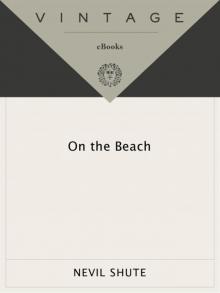 On the Beach
On the Beach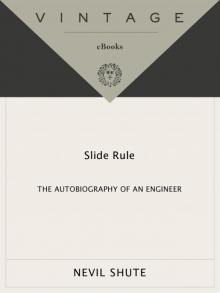 Slide Rule
Slide Rule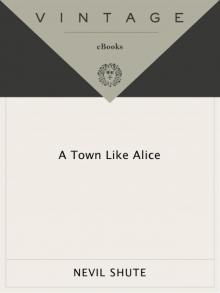 A Town Like Alice
A Town Like Alice The Far Country
The Far Country Pied Piper
Pied Piper Round the Bend
Round the Bend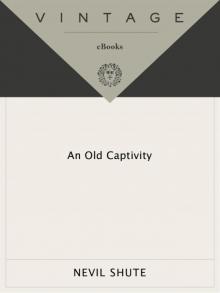 An Old Captivity
An Old Captivity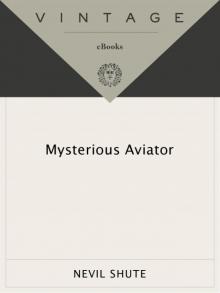 Mysterious Aviator
Mysterious Aviator The Breaking Wave
The Breaking Wave Marazan
Marazan Lonely Road
Lonely Road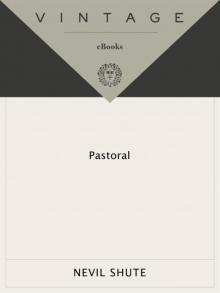 Pastoral
Pastoral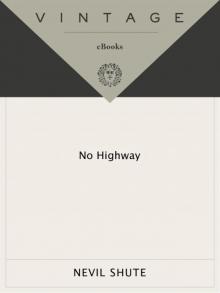 No Highway
No Highway Stephen Morris and Pilotage
Stephen Morris and Pilotage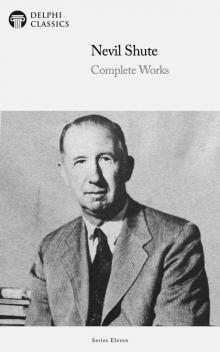 Complete Works of Nevil Shute
Complete Works of Nevil Shute Most Secret
Most Secret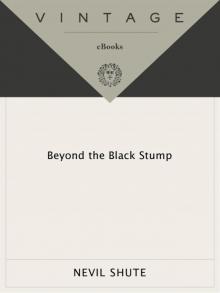 Beyond the Black Stump
Beyond the Black Stump The Rainbow and the Rose
The Rainbow and the Rose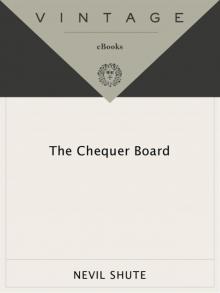 The Chequer Board
The Chequer Board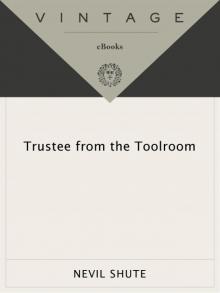 Trustee From the Toolroom
Trustee From the Toolroom Ordeal
Ordeal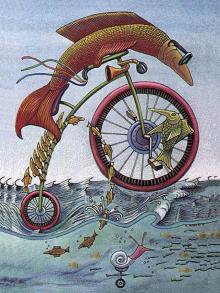 Stephen Morris
Stephen Morris